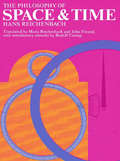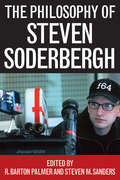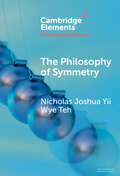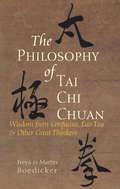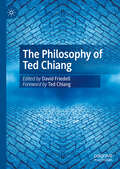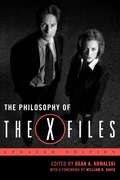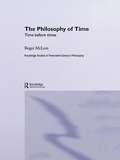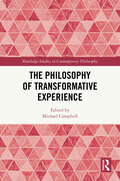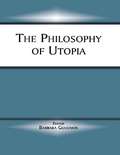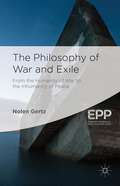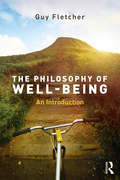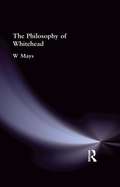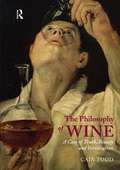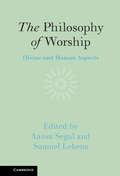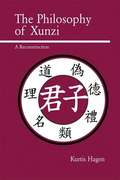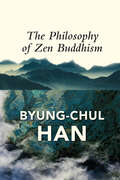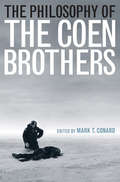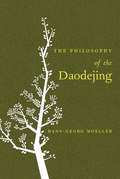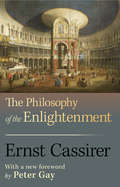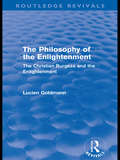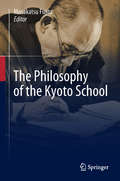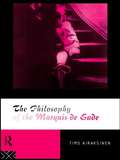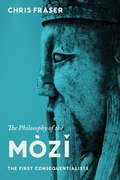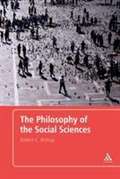- Table View
- List View
The Philosophy of Space and Time
by Hans ReichenbachAn important landmark in the development of the empiricist conception of geometry, this book is still one of the clearest and most valuable expositions of the crisis in physical science and mathematics occasioned by the advent of the non-Euclidean geometries. With unusual depth and clarity, it covers the problem of the foundations of geometry, the theory of time, the theory and consequences of Einstein's relativity including: relations between theory and observations, coordinate definitions, relations between topological and metrical properties of space, the psychological problem of the possibility of a visual intuition of non-Euclidean structures, and many other important topics in modern science and philosophy.While some of the book utilizes mathematics of a somewhat advanced nature, the exposition is so careful and complete that most people familiar with the philosophy of science or some intermediate mathematics will understand the majority of the ideas and problems discussed.Partial CONTENTS: I. The Problem of Physical Geometry. Universal and Differential Forces. Visualization of Geometries. Spaces with non-Euclidean Topological Properties. Geometry as a Theory of Relations. II. The Difference between Space and Time. Simultaneity. Time Order. Unreal Sequences. Ill. The Problem of a Combined Theory of Space and Time. Construction of the Space-Time Metric. Lorentz and Einstein Contractions. Addition Theorem of Velocities. Principle of Equivalence. Einstein's Concept of the Problems of Rotation and Gravitation. Gravitation and Geometry. Riemannian Spaces. The Singular Nature of Time. Spatial Dimensions. Reality of Space and Time.
The Philosophy of Steven Soderbergh (The Philosophy of Popular Culture #Ppcs)
by R. Barton Palmer and Steven M. Sanders&“Provocative, insightful, and instructive analysis of the cinematic and philosophical significance of Steven Soderbergh&’s work.&” —Jason Holt, editor of The Daily Show and Philosophy: Moments of Zen in the Art of Fake News Widely regarded as a turning point in American independent cinema, Steven Soderbergh's sex, lies, and videotape launched the career of its twenty-six-year-old director, whose debut film was nominated for an Academy Award and went on to win the Cannes Film Festival&’s top award, the Palme d&’Or. The Philosophy of Steven Soderbergh breaks new ground by investigating salient philosophical themes through the unique story lines and innovative approaches to filmmaking that distinguish this celebrated artist. Editors R. Barton Palmer and Steven M. Sanders have brought together leading scholars in philosophy and film studies for the first systematic analysis of Soderbergh&’s entire body of work, offering the first in-depth exploration of the philosophical ideas that form the basis of the work of one of the most commercially successful and consistently inventive filmmakers of our time.
The Philosophy of Symmetry (Elements in the Philosophy of Physics)
by Nicholas Joshua Yii Wye TehThis Element is a concise, high-level introduction to the philosophy of physical symmetry. It begins with the notion of 'physical representation' (the kind of empirical representation of nature that we effect in doing physics), and then lays out the historically and conceptually central case of physical symmetry that frequently falls under the rubric of 'the Relativity Principle,' or 'Galileo's Ship.' This material is then used as a point of departure to explore the key hermeneutic challenge concerning physical symmetry in the past century, namely understanding the physical significance of the notion of 'local' gauge symmetry. The approach taken stresses both the continuity with historically important themes such as the Relativity Principle, as well as novel insights earned by working with contemporary representational media such as the covariant phase space formalism.
The Philosophy of Tai Chi Chuan
by Freya Boedicker Martin BoedickerThe essence of Tai Chi Chuan lies in the rich philosophy of ancient China. While most Tai Chi practitioners are aware of the value that studying Chinese philosophy can bring to their practice, it is often difficult to pick out those texts that are most relevant to Tai Chi and connected to its development. The Philosophy of Tai Chi Chuan presents, for the first time, a concise overview of the Chinese martial and spiritual philosophies that drive this ancient tradition.Authors Freya and Martin Boedicker, who teach Tai Chi throughout Europe and South Africa, present freshly translated excerpts from such popular and widely studied works as the Tao Te Ching, the I Ching, and The Art of War, as well as writings by philosophers and strategists such as Zhuangzi and Wuzi. Each chapter of this concise volume focuses on a single work or philosopher, and includes a short history of each one as well as a description of their relevance to Tai Chi. An extensive glossary of important Chinese terms rounds out the book. The Philosophy of Tai Chi Chuan offers readers a direct connection with the concepts that form the foundation of Tai Chi, inspiring a deeper understanding of the art and its applications.From the Hardcover edition.
The Philosophy of Ted Chiang
by David FriedellTed Chiang is one of the most insightful science fiction writers of our time. His writing has garnered high praise, including four Nebula awards, four Hugo awards and the John W. Campbell Award for Best New Writer. His short story, “Story of Your Life,” was the basis of the 2016 film Arrival. This volume, which includes a foreword by Chiang and twenty-one short essays by philosophers, analyzes the philosophical significance of Chiang’s popular science fiction. These essays discuss how Chiang’s stories engage with age-old and contemporary philosophical questions pertaining to free will, God, technology, existentialism, beauty, procreation, contradictions, time, human intelligence, alien intelligence, and artificial intelligence. This volume probes terrain that should be of interest to experts in philosophy, while still being accessible to a general audience interested in science fiction. These essays, like Ted Chiang’s writing, demonstrate how excellent science fiction can help us to think about the world and our place in it.
The Philosophy of The X-Files: Updated Edition (The Philosophy of Popular Culture #Ppcs)
by Dean A. KowalskiLearn to search for the truth that&’s out there in essays about what &“may be the most philosophically challenging series in the history of television&” (Paul A. Cantor, author of Gilligan Unbound: Pop Culture in the Age of Globalization). In The Philosophy of The X-Files, Dean A. Kowalski has gathered a remarkable cast of contributors to shed light on the philosophical mysteries of the television show The X-Files. With sections devoted to the show&’s credos—&“The truth is out there,&” &“Trust no one,&” and &“I want to believe&” —as well as individual characters and specific episodes, The Philosophy of The X-Files illuminates the philosophical assumptions and presuppositions of the show and provides a lively, accessible way to better understand philosophy and philosophical inquiry—while exploring topics ranging from alienation to determinism to democracy.
The Philosophy of Time: Time before Times (Routledge Studies in Twentieth-Century Philosophy)
by Roger McLureThe question of the existence and the properties of time has been subject to debate for thousands of years. This considered and complete study offers a contrastive analysis of phenomenologies of time from the perspective of the problematics of the visibility of time. Is time perceptible only through the veil of change? Or is there a naked presence of 'time itself'? Or has time always effaced itself?McClure's new work also stages confrontations between phenomenology of time and analytical philosophy of time. By doing so he explores ancient issues from a fresh perspective, such as whether time passes, whether experimental time is 'real time', and whether the very concept of time is contradictory.
The Philosophy of Transformative Experience (Routledge Studies in Contemporary Philosophy)
by Michael CampbellThis volume examines the nature and significance of transformative experiences as they occur across a variety of contexts in human life. By treating these events as social as well as individual phenomena, the essays bring to light the various ways in which cultural and institutional forces influence narratives of personal change. The ease with which we identify transformative experiences shows their importance for our sense of the potentialities inherent in human life, even while their disruptive character threatens confidence in our capability to make rational decisions concerning our future well-being. Yet, narratives of transformation are not just individual artefacts, but are also given support and structure through social forces including shared languages, practices, and institutions. What are the cultural and institutional contexts which enable this form of self-conceptualisation, and what happens when social changes undermine the cogency of these narratives? The chapters in this volume investigate these issues through a blend of philosophical theory and applied cases, working across the disciplinary boundaries of philosophy and social anthropology. Contributors investigate topics including recovery from trauma; the role of narratives in gender transition; climate activism; the ethical ramifications of war; the role of media in framing narratives of ethical change; and the university as a site of transformative experience. The Philosophy of Transformative Experience will be of interest to philosophers working in ethics, political philosophy, and decision theory, as well as scholars and advanced students in anthropology, sociology, and literary studies.
The Philosophy of Utopia
by Barbara GoodwinThis collection addresses the important function of utopianism in social and political philosophy and includes debate on what its future role will be in a period dominated by dystopian nightmare scenarios.
The Philosophy of War and Exile
by Nolen GertzArguing that the suffering of combatants is better understood through philosophy than psychology, as not trauma, but exile, this book investigates the experiences of torturers, UAV operators, cyberwarriors, and veterans to reveal not only the exile at the core of becoming a combatant, but the evasion from exile at the core of being a noncombatant.
The Philosophy of Well-Being: An Introduction
by Guy FletcherWell-being occupies a central role in ethics and political philosophy, including in major theories such as utilitarianism. It also extends far beyond philosophy: recent studies into the science and psychology of well-being have propelled the topic to centre stage, and governments spend millions on promoting it. We are encouraged to adopt modes of thinking and behaviour that support individual well-being or 'wellness'. What is well-being? Which theories of well-being are most plausible? In this rigorous and comprehensive introduction to the topic, Guy Fletcher unpacks and assesses these questions and many more, including: Are pleasure and pain the only things that affect well-being? Is desire-fulfilment the only thing that makes our lives go well? Can something be good for someone who does not desire it? Is well-being fundamentally connected to a distinctive human nature? Is happiness all that makes our lives go well? Is death necessarily bad for us? How is the well-being of a whole life related to well-being at particular times? Annotated further reading and study and comprehension questions follow each chapter, and a glossary of key terms is also included, making The Philosophy of Well-Being essential reading for students of ethics and political philosophy. This title is also suitable for those in related disciplines such as psychology, politics and sociology.
The Philosophy of Whitehead (Muirhead Library Of Philosophy Ser.)
by Mays, WFirst published in 2002. Routledge is an imprint of Taylor & Francis, an informa company.
The Philosophy of Wine: A Case of Truth, Beauty and Intoxication
by Cain ToddDoes this Bonnes-Mares really have notes of chocolate, truffle, violets, and merde de cheval? Can wines really be feminine, profound, pretentious, or cheeky? Can they express emotion or terroir? Do the judgements of 'experts' have any objective validity? Is a great wine a work of art? Questions like these will have been entertained by anyone who has ever puzzled over the tasting notes of a wine writer, or been baffled by the response of a sommelier to an innocent question. Only recently, however, have they received the serious philosophical attention they deserve. Touching on issues in metaphysics, epistemology, the philosophy of mind, and aesthetics, this book provides a clear and engaging discussion of the philosophical significance of wine that will be accessible to all wine lovers, specialists and non-specialists alike. The author offers throughout a sustained defence of the objectivity of wine judgements, a demystification of the nature of expertise, and a theory of the aesthetic value of wine and its appreciation.
The Philosophy of Worship: Divine and Human Aspects
by Aaron Segal Samuel LebensWorship is central to the lives of billions of people worldwide. Yet, despite the recent flourishing of analytical philosophy of religion, there has been very little attention paid to the philosophical questions raised by worship. This book is the first volume to explore the philosophy of worship. Written in a clear style that eschews unnecessary technical jargon, it considers the metaphysical, ethical, and psychological issues associated with worship, among them: What, if anything, is the point of worship? What, if anything, makes a being worthy of worship? Can worship hold value for atheists? What, if anything, might be wrong with idolatry? These questions, and more, sit at the heart of this book. With contributions from world renowned philosophers and important early career voices, this volume sets the agenda for future work in the philosophy of worship.
The Philosophy of Xunzi: A Reconstruction
by Kurtis Hagen<i>The Philosophy of Xunzi</i> sheds light on the teachings of a disciplined thinker who contradicted conventional schools of Confucian thought. Living in a time of great instability and discord, Xunzi came to believe that man’s desires, if left unchecked, would lead to ruin, and so advocated a system of strict societal controls. His best-known disciple took a more extreme stance, likely coloring history’s view of Xunzi. This new examination of his complex, sometimes harsh ideas, uncovers a deeper humanity and a restrained optimism in his writings, giving them new relevance for present-day Confucians and Western thinkers.
The Philosophy of Zen Buddhism
by Byung-Chul HanZen Buddhism is a form of Mahāyāna Buddhism that originated in China and is strongly focused on meditation. It is characteristically sceptical towards language and distrustful of conceptual thought, which explains why Zen Buddhist sayings are so enigmatic and succinct. But despite Zen Buddhism&’s hostility towards theory and discourse, it is possible to reflect philosophically on Zen Buddhism and bring out its philosophical insights. In this short book, Byung-Chul Han seeks to unfold the philosophical force inherent in Zen Buddhism, delving into the foundations of Far Eastern thought to which Zen Buddhism is indebted. Han does this comparatively by confronting and contrasting the insights of Zen Buddhism with the philosophies of Plato, Leibniz, Fichte, Hegel, Schopenhauer, Nietzsche, Kierkegaard, Heidegger and others, showing that Zen Buddhism and Western philosophy have very different ways of understanding religion, subjectivity, emptiness, friendliness and death. This important work by one of the most widely read philosophers and cultural theorists of our time will be of great value to anyone interested in comparative philosophy and religion.
The Philosophy of the Coen Brothers (The Philosophy of Popular Culture #Ppcs)
by Mark T. Conard&“Written for both fans of the Coen brothers and the philosophically curious, without the technical language . . . educational and entertaining.&” —Library Journal Joel and Ethan Coen have made films that redefined the gangster movie, the screwball comedy, the fable, and the film noir, but no matter what genre they&’re playing with, they consistently focus on the struggles of complex characters to understand themselves and their places in the strange worlds they inhabit. To borrow a phrase from Barton Fink, all Coen films explore &“the life of the mind&” and show that the human condition can often be simultaneously comic and tragic, profound and absurd. The essays in this book explore the challenging moral and philosophical terrain of the Coen repertoire. Several address how Coen films often share film noir&’s essential philosophical assumptions: power corrupts, evil is real, and human control of fate is an illusion. In Fargo, not even Minnesota&’s blankets of snow can hide Jerry Lundegaard&’s crimes or brighten his long, dark night of the soul. The tale of love, marriage, betrayal, and divorce in Intolerable Cruelty transcends the plight of the characters to illuminate competing theories of justice. Even in lighter fare, such as Raising Arizona and The Big Lebowski, the comedy emerges from characters&’ journeys to the brink of an amoral abyss. However, the Coens often knowingly and gleefully subvert conventions and occasionally offer symbolic rebirths and other hopeful outcomes. At the end of The Big Lebowski, for example, the Dude abides, his laziness has become a virtue, and the human comedy is perpetuating itself with the promised arrival of a newborn Lebowski. The Philosophy of the Coen Brothers sheds new light on the work of these cinematic visionaries. From Blood Simple to No Country for Old Men, the Coens&’ characters look for answers—though in some cases, their quest for answers leads, at best, only to more questions.
The Philosophy of the Daodejing: The New, Highly Readable Translation Of The Life-changing Ancient Scripture Formerly Known As The Tao Te Ching (Philosophy)
by Hans-Georg MoellerFor centuries, the ancient Chinese philosophical text the Daodejing (Tao Te Ching) has fascinated and frustrated its readers. While it offers a wealth of rich philosophical insights concerning the cultivation of one's body and attaining one's proper place within nature and the cosmos, its teachings and structure can be enigmatic and obscure. Hans-Georg Moeller presents a clear and coherent description and analysis of this vaguely understood Chinese classic. He explores the recurring images and ideas that shape the work and offers a variety of useful approaches to understanding and appreciating this canonical text. Moeller expounds on the core philosophical issues addressed in the Daodejing, clarifying such crucial concepts as Yin and Yang and Dao and De. He explains its teachings on a variety of subjects, including sexuality, ethics, desire, cosmology, human nature, the emotions, time, death, and the death penalty. The Daodejing also offers a distinctive ideal of social order and political leadership and presents a philosophy of war and peace.An illuminating exploration, The Daodejing is an interesting foil to the philosophical outlook of Western humanism and contains surprising parallels between its teachings and nontraditional contemporary philosophies.
The Philosophy of the Enlightenment
by Ernst Cassirer Peter GayThe present book aims to be both more and less than a monograph on the philosophy of the Enlightenment. It is much less, for the primary task of such a monograph would be to offer the reader a wealth of detail and to trace the genesis and development of all the special problems of this philosophy.
The Philosophy of the Enlightenment: The Christian Burgess and the Enlightenment (Routledge Revivals)
by Lucien GoldmannIn this reissue, originally published in English in 1973, French philosopher Lucien Goldmann turns his attention to the Enlightenment of the eighteenth century, the great age of liberalism and individualism and analyses the ‘mental structures’ of the outlook of the philosophes, who showed that the ancien regime and the privileges of the Church were irrational anachronisms. In assessing the strengths and limitations of individualism, Goldmann considers the achievements and limitations of the Enlightenment. He discusses the views of Hegel and Marx and examines the relation between liberal scepticism and traditional Christianity to point the way to the possible reconciliation of the two seemingly incompatible ‘world visions’ of East and West today.
The Philosophy of the Kyoto School
by Masakatsu FujitaThe main purpose of this book is to offer to philosophers and students abroad who show a great interest in Japanese philosophy and the philosophy of the Kyoto school major texts of the leading philosophers. This interest has surely developed out of a desire to obtain from the thought of these philosophers, who stood within the interstice between East and West, a clue to reassessing the issues of philosophy from the ground up or to drawing new creative possibilities.The present condition seems to be, however, that the material made available to further realize this kind of intellectual dialogue is far too scarce. This book is intended to be of some help in this regard.The book presents selected texts of representative philosophers of the Kyoto school such as Nishida Kitaro, Tanabe Hajime, Miki Kiyoshi, Nishitani Keiji, and others who best illustrate the characteristics of this school, and works that together portray its image as a whole. Those who are interested in Japanese philosophy or specifically the philosophy of the Kyoto School can survey a comprehensive representation from this book.These texts are, of course, quite difficult and cannot be well understood without sufficient preliminary knowledge. Expository essays have therefore been included after each text to provide guidance. In each of these commentaries a scholar of our time with deep understanding of the philosopher in question has provided an account of his life, intellectual journey, and the significance of the text included here.From this book will emerge a new dialogue of ideas that in turn will engender new developments in philosophy, thereby further expanding the network of philosophical thought worldwide.
The Philosophy of the Marquis de Sade
by Timo AiraksinenThe Marquis de Sade is famous for his forbidden novels like Justine, Juliette, and the 120 Days of Sodom. Yet, despite Sade's immense influence on philosophy and literature, his work remains relatively unknown. His novels are too long, repetitive, and violent. At last in The Philosophy of the Marquis de Sade, a distinguished philosopher provides a theoretical reading of Sade. Airaksinen examines Sade's claim that in order to be happy and free we must do evil things. He discusses the motivations of the typical Sadean hero, who leads a life filled with perverted and extreme pleasures, such as stealing, murder, rape, and blasphemy. Secondary sources on Sade, such as Hobbes, Erasmusm, and Brillat-Savarin are analyzed, and modern studies are evaluated. The Philosophy of the Marquis de Sade greatly enhances our understanding of Sade and his philosophy of pain and perversion.
The Philosophy of the Mòzi: The First Consequentialists
by Chris FraserMohism was an ancient Chinese philosophical movement founded in the fifth century BCE by the charismatic artisan Mòzi, or "Master Mo." Its practitioners advanced a consequentialist ethics, along with fascinating political, logical, and epistemological theories, that set the terms of philosophical argumentation and reflection in China for generations to come. Mohism faded away in the imperial era, leaving the impression that it was not as vital as other Chinese philosophical traditions, yet a complete understanding of Confucianism or Daoism is impossible without appreciating the seminal contribution of Mohist thought.The Philosophy of the Mòzi is an extensive study of Mohism, situating the movement's rise and decline within Chinese history. The book also emphasizes Mohism's relevance to modern systems of thought. Mohism anticipated Western utilitarianism by more than two thousand years. Its political theory is the earliest to outline a just war doctrine and locate the origins of government in a state of nature. Its epistemology, logic, and psychology provide compelling alternatives to contemporary Western mentalism. More than a straightforward account of Mohist principles and practice, this volume immerses readers in the Mohist mindset and clarifies its underpinning of Chinese philosophical discourse.
The Philosophy of the Mòzĭ: The First Consequentialists
by Chris FraserMohism was an ancient Chinese philosophical movement founded in the fifth century BCE by the charismatic artisan Mòzi, or "Master Mo." Its practitioners advanced a consequentialist ethics, along with fascinating political, logical, and epistemological theories, that set the terms of philosophical argumentation and reflection in China for generations to come. Mohism faded away in the imperial era, leaving the impression that it was not as vital as other Chinese philosophical traditions, yet a complete understanding of Confucianism or Daoism is impossible without appreciating the seminal contribution of Mohist thought. The Philosophy of the Mòzi is an extensive study of Mohism, situating the movement's rise and decline within Chinese history. The book also emphasizes Mohism's relevance to modern systems of thought. Mohism anticipated Western utilitarianism by more than two thousand years. Its political theory is the earliest to outline a just war doctrine and locate the origins of government in a state of nature. Its epistemology, logic, and psychology provide compelling alternatives to contemporary Western mentalism. More than a straightforward account of Mohist principles and practice, this volume immerses readers in the Mohist mindset and clarifies its underpinning of Chinese philosophical discourse.
The Philosophy of the Social Sciences: An Introduction
by Robert BishopThe book not only offers lucid and incisive coverage of the philosophy of the social sciences, but also extends the major debates and considers the latest directions in this growing area of philosophical interest. Robert C. Bishop's cogent and rigorous analysis is supplemented by useful pedagogical features, including key examples from philosophical writing; summaries of core debates; sample questions and exercises; and guides for further reading.
